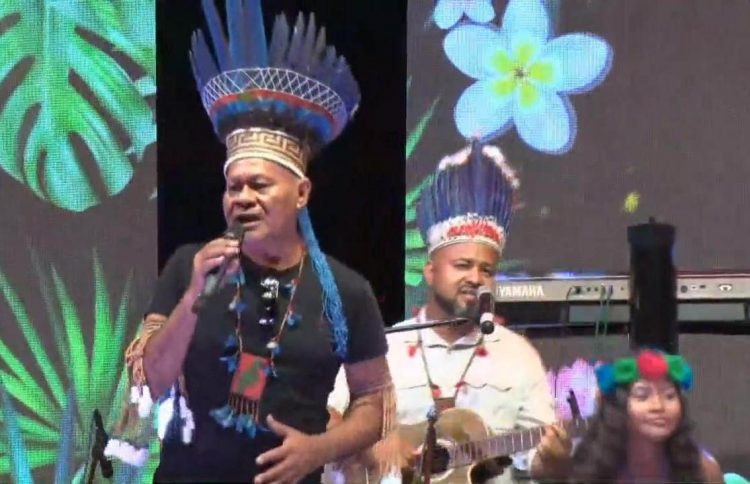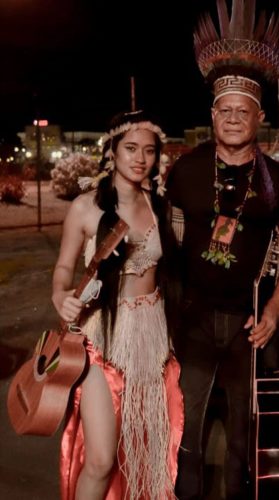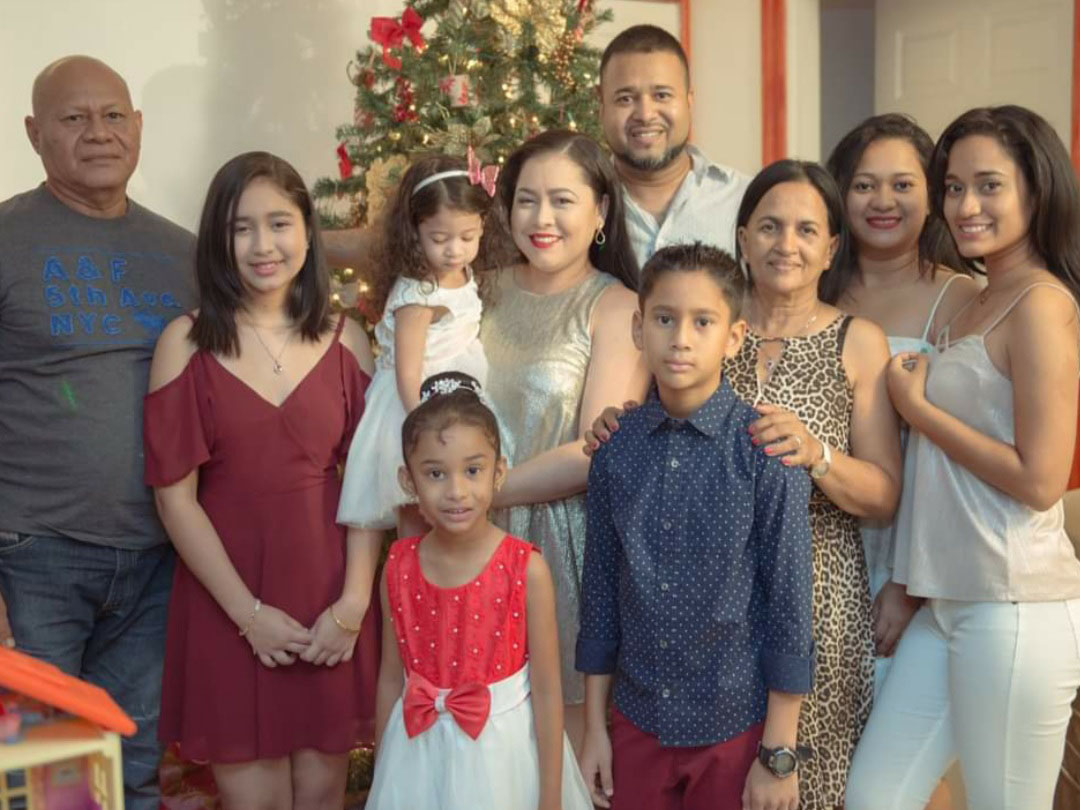Self-taught musician and leader of the Couchman Family Band, 66-year-old Leon Couchman is hoping that music produced locally could attract corporate sponsorship in order to preserve Indigenous and other Guyanese rhythms as he has lost much of his own compositions because of production, copyright and sponsorship issues.
“Our music is to inspire and to make people happy,” Couchman said. “Some-where and somehow, if we can get some help to build our own studio we can also record all other Amerindian music. We have the time and ability to go where they are and record them. We have the ability to do these things. We would love to do it.”
In a recent interview with Stabroek Weekend, he related that owing to a lack of funding and sponsorship, the family band had not been able to record its music, though it performed when and where invited.

Born in the Indigenous community of Bethany Mission, Supenaam River, Couchman said that as a little boy he had always liked music and always tried to play some type of instrument.
“Everyone enjoys music but we are the music makers. I could beat a ‘tinnin’ [tin] cup or a bucket and sing to you and you will enjoy it. That’s the power of music,” he said.
The first instrument he played was the banjo, a four-stringed instrument. He then learnt to play the guitar. “My father was a guitarist. He used to play and I used to listen. He didn’t teach me. I listened. I picked up the notes and practiced at every chance I got. I was self-taught. From six years [old] I was strumming the banjo,” he said.
Later on, playing the guitar became a hobby for him. When his peers would go out to play football he would pick up the guitar, strum it and sing. “Then I began to play for the church and concerts and so on. When I was nine years old, I promised myself that I would write my own songs,” he recalled. “As I grew older I started to write my own songs.”
Couchman obtained a primary educa-tion at the then Seventh-Day Adventist School at Bethany Mission. Because of lack of finances he did not attend secondary school. To help out the family he took odd jobs.
“I had to start working at an early age,” he said. “I was a little boy so I did things that included hunting and fishing because I wasn’t really big enough to take on full-time jobs. As I grew older I started to like mechanics. I trained as a mechanic from my teenage days then I became a full-out mechanic. With further training I became a diesel/marine engineer. I specialize in diesel and gasoline engines.”
He gained early exposure in mechanics working with A Mazaharally and Sons and Rambarran’s in Supenaam. He was then recommended to complete several theoretical courses in mechanics with the National Technical School in California which he did.

“I gained experience in different types of machines and engines and I eventually became a marine engineer travelling from country to country for quite a while,” he said.
He has travelled to almost every port in the Caribbean and to a few Latin Ameri-can countries.
He lived briefly in Venezuela and on his return, moved to the West Coast Deme-rara. He is now a resident of Tuschen, East Bank Essequibo.
Couchman married when he was 24 years old and he and his wife Kayo are parents of Raul, Natassia and Karissia. They all make up the Couchman Family Band.
Popular
Couchman said he wrote one of his more popular songs, “Guyana My Homeland”, before his children were born. “I wrote about 13 songs before they were born but only a few were published,” he noted. Since then he has written another eight songs.
The songs he has written reflect the life he has lived in the hinterland. They tell, according to him, a Guyana story, an Indigenous story, his life hunting in the forests, swimming in the rivers and creeks, climbing and walking under trees, picking fruits and seeing animals in their natural habitat.
“Most Guyanese have never walked through a savannah among the tall grasses and under shady palm trees. I did those things,” he said. “Catching fish in ponds and palm trees, cooking it on the creek or river bank and playing my music to a little crowd. That is happiness for me and I share that to people in my music.”
His three most popular songs are “Guyana My Homeland”, “Amerindian Man” and “Freedom Trail”.
One of the songs he wrote for which he has no copyright is “The Amerindian Life is Not So Easy”. He wrote and performed the song in Canada once for Guyana’s independence anniversary. “That song took me to Canada. I performed there with some dancers. It was successful. I came back, one of my friends took it up and he recorded it,” he said. “It is now under the name of Pakuri. I have no credit. At the time I wrote it and performed it, it wasn’t recorded so I had no copyright.”
Versatile in musical beats for songs and dances, Couchman has tried his best to preserve the music of a number of the traditional Amerindian songs and dances such as the mari-mari, baboon or monkey dance and bemichi (hummingbird).
“I play them but they are not my original music. They are the traditional music I try to keep alive in my repertoire. I liven them with new beats. At the moment, I have lost the copies of some of them. I could make them all back but I need studio time. I have done the music for all of these and I have no right to them. People do not even know I did them,” he lamented. “They are getting lost because I do not have them on me. Because of not having the rights to my work. I made most, if not all, with my family.”
Couchman said he can make any musical beats, including soca, soul, chutney, latino and reggae. The Couchman Family Band sings some songs in Spanish and some in English. “I am a true Guyanese in music,” he said.
All his children are skilled with the guitar and the keyboard.
However, the family has not performed as a band in recent years, doing solos instead with a family member or two as back-up.
When the band was performing at its peak, Couchman said, Raul would be the keyboardist and the singers were Natassia and Karissia. The drummer would be his wife Kayo who was also the manager.
The band was a natural evolution in the home. “When I played the guitar in the home, Raul liked it and he started playing and singing. Natassia and Karissia liked it and they too joined in. We said, ‘Ok, let’s get rolling’. My wife started beating the drum, each child held an instrument and so we started. We never had any formal training. Just like how I learnt, they learnt. People said we sounded good and to this day when I sing with my children, I always enjoy it,” he said.
As a family band they performed at heritage villages and several other places across the country. Couchman, who is of Lokono (Arawak) origin, noted that his wife who is of East Indian ancestry, writes and sings chutney songs, and has been involved in chutney singing competitions. A music lover, she has assisted him in writing the lyrics of some songs and is also a back-up singer. He himself has written his own chutney songs of which “I Miss My Dulahin” has been recorded and is the most popular.
Proud of his children, Couchman said they have also written their own songs. Karissia released the most recent and Couchman accompanied her in her performance at the opening of this year’s Amerindian Heritage Village at Providence National Stadium. Her most recent piece is “Amerindians of Guyana” with succinct lyrics telling of how their way of life contributes to the preservation of nature; the music was arranged by Leon and Raul and recorded by Raul.
Natassia wrote and sings the catchy tune “Baby” in English and Spanish.
Raul has also written and published his own songs.
According to Couchman, his grandchildren, Raul’s three children, “are very talented and they too can sing. All three can sing and play musical instruments, even the youngest.”
Reviving music
There were times when Couchman needed to record music but needed money to pay for it.
Asked whether he has ever approached the government or the private sector for sponsorship, Couchman said he had done so in the past.
“Recording costs money. I tried seeking sponsorship but people and businesses are not interested in local artistes. I have lost a lot of my music and I keep losing all the time. I just lose rights and demos. To record one song now would cost some hundreds of thousands of dollars. As much as I and my family like music, we can’t be producing music and looking forward to nothing. It is sad. People don’t value what we can do. They do not want to put a monetary value to it. If I go to plant some greens that is what people know. They don’t respect the music, the culture, they say it is a waste of time in this country. It is very sad. You could hear my music all over the world but I have no money for it. Not even a pair of boots or a shirt I could say I bought with money for my music. I would repair engines and I would get money for those,” he said.
“It is just for the love of music and knowing that it makes people happy that we create music. I would have been happy if I could have earned from my music. That would have been real great. Even teach people music. Even help other people out. I like to share what I have. I get happiness from sharing things.”
He noted that Karissia is worried about the loss of the music, rights and demos that he has produced. “She would like to revive some of the music and try to retrieve what she knows is still around before it is too late. She would need the help that I did not get. She would need sponsorship and support. She is ready right now,” he noted.
Karissia is currently looking for sponsorship for a Christmas song and a national song. “I did the music. If we get a studio this week, by the end of two weeks you could hear it on the radio,” Couchman said.
They are not looking for big money, Couchman said, “We as a family outfit can do the music. We have the talent in the family. Raul and I are certified musical engineers. We can arrange, play and record music.”
He said his family members have Christmas and gospel songs. “We could get a demo for some of the songs we have but we do not have the backup or sponsorship from anywhere. We have to come up with our own money if we have to talk to a studio,” he said. “When we do music, we are not doing it for ourselves, we are doing it for the people of Guyana and the world. We need some help.”
Couchman is invited from time to time to play at government functions. In 2019 he was honoured with a citation for his contribution to Indigenous culture and to the field of music by the Ministry of Indigenous Peoples Affairs.






